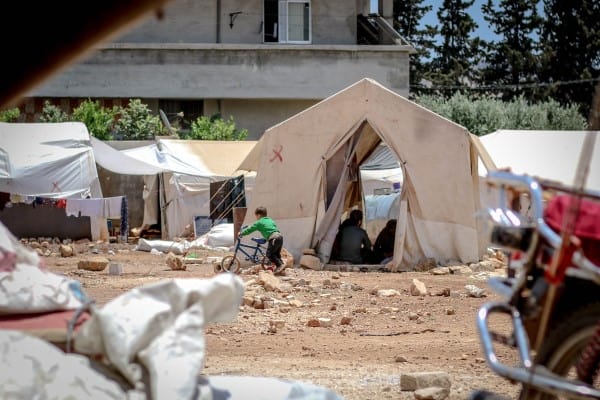This page contains affiliate links. This means if you a follow a link and make a purchase, at no additional cost to you, Humanitarian Careers will receive a commission. Thank you for supporting the site.
Working in humanitarian aid is an exciting and rewarding career. However, securing your first job in the aid industry can be a challenge. Many people looking for entry level jobs in the humanitarian sector get disheartened by the high competition and time it can take to secure their first position. Despite this, there are some key stages that can be followed that will increase your chances of landing an entry level job in international aid.
There are three main things you should do get an entry level job in humanitarian aid. The first is to gain the relevant qualifications, the second is to a send a lot of applications and the third is to target the applications at the right NGO’s.
However, as simple as this may sound, getting these stages right is crucial to ensure you secure an entry level humanitarian job.
Get the Relevant Qualifications
When searching for an entry level job in humanitarian aid it is important you have strong and relevant qualifications. This is because you won’t have previous work experience to demonstrate to an aid agency your knowledge and skills. Firstly, you should definitely have an undergraduate degree.
Although most humanitarian aid organisations look for applicants with master’s degrees, it is not impossible to get an entry level job with just a bachelors. However, if you are applying straight from an undergraduate degree, make sure your bachelors is in a relevant subject like international development, international relations, peace and conflict studies or refugee and migration.
Generally, it is best to have a masters degree before trying to get an entry level job in the humanitarian industry. This is because the majority of aid agencies ask for masters as key requirements for jobs. Although the additional knowledge gained by completing a masters does make for a strong application, often humanitarian organisations use the requirements of a masters as a way to filter down the number of applications they receive.
To improve your chances of getting an entry level job in humanitarian aid, study a relevant masters like international development or humanitarian action. Also consider a technical masters course such as humanitarian supply chain management or humanitarian health. It does not matter so much if your undergraduate degree is not in a relevant subject if you complete a masters that is.
As well as completing university courses that are relevant to humanitarian aid, to help in your hunt for an entry level job in the humanitarian industry it is good to complete relevant short courses as well.
There are several organisations offering either in person or online courses in humanitarian action that focus on specific parts of humanitarian work. These courses can cover areas such as project management or monitoring and evaluation, as well as technical areas like nutrition or water and sanitation. Taking these courses online or in-person will give more specific, and often more practical, knowledge of humanitarian aid that complements the theory gained through your university studies.
Alongside university and short course qualifications, a key type of experience that should be sought before trying to get an entry job with an aid agency is volunteering. By volunteering you not only gain some practical experience to include in your CV, but you also show the humanitarian organisations you are applying to your dedication to helping others. Importantly, although volunteering abroad can sometimes help in getting your first job in humanitarian aid, actually volunteering closer to home can be more beneficial, as well as more practical and cheaper.
A great way to volunteer is to look for local organizations working with refugees in your home country. Often these groups need assistance helping with distributions of food or teaching English. Volunteering with local refugee groups can give you great relevant experience in humanitarian action.
If you do have some relevant work experience, perhaps with other charity work or appropriate skills such as finance or logistics you’ve developed in the private sector, make sure these are highlighted clearly in your applications.
Humanitarian Aid Online Courses
If you are looking to work in humanitarian aid, we highly recommend the online course International Humanitarian and Development Careers. We think it provides one of the best overviews of the humanitarian sector and gives valuable insights for those searching for a job in humanitarian aid. Follow the link to the course’s page for more information.
We also think the Humanitarian Action Response and Relief online course offered by Coventry University is a must for anyone looking to become a humanitarian aid worker. It only takes around three weeks to complete and would be a major addition to the CV of anyone looking to work in the aid sector. The link is to the course’s page.
The Enhancing Development Effectiveness and Poverty Alleviation online course provides students with a theoretical basis for working in complex humanitarian settings. We think it’s one of the top online courses for those who want to understand how humanitarian aid works. Click the link to visit the course’s page for more information.
Send a Lot of Applications
The humanitarian aid industry is very competitive, especially for entry level jobs. This is important to understand but it is also important not get discouraged whilst looking for your first job. Entry level humanitarian jobs often get hundred of applications. However, remember that a lot of people who are applying have not gained the relevant qualifications or taken the time to complete short courses and volunteer, and so by doing these you often have an advantage over most of the other applicants. With that said, competition is still strong for entry level jobs in humanitarian organisations, and therefore the only way to off-set this is to send a lot of applications… and that means a lot!
As a general rule, five to ten applications a week for entry level humanitarian jobs should be your aim. That may sound like a lot, but by sending so many applications you are increasing your chances of being short-listed, interviewed and then getting your first job in international aid. To help with sending so many applications, there are two important things to remember. Firstly, do not focus on single jobs or even specific areas of the aid work.
For entry level jobs, your aim is to get your foot in the door of the humanitarian industry and therefore you should pretty much apply for anything, anywhere with any aid organisation. At the early stages of your career you cannot be choosy.
The second key thing to remember when sending a large number of applications for entry level humanitarian jobs is that each application should be written specifically for the job you are applying for, and your CV and cover letter should be updated to be relevant to the job advertised.
Create a system where you can quickly change your CV text and key paragraphs of your personal statement to save time when sending so many applications. Sending enough applications to get an entry level humanitarian job should almost be your part-time job. Remember, the aid industry is competitive but you can beat the competition by sending more applications.

Target the Right NGOs
When trying to get an entry level job in humanitarian aid, the third key thing is to make sure you are targeting your applications mainly to the right humanitarian organisations. Although all humanitarian aid agencies have some entry level jobs, and therefore you should not rule out applying to any NGO, there are some humanitarian organisations that specialise more in recruiting entry level positions.
It is good to remember that small and medium sized humanitarian agencies often recruit less experienced people. Focus the majority of your applications on these. Larger and more well-known humanitarian organisations often get higher volumes of applications.
Another thing to remember when selecting humanitarian organisations to apply to for entry level jobs is that some NGOs focus more specifically on recruiting and training new aid workers, when others generally hire more experienced people. Humanitarian organisations such as ACTED, Solidarites International and Premiere Urgence Internationale (PUI) are well known for offering entry level positions. In contrast, NGO’s such as CARE International and Save the Children generally appear to have less entry level humanitarian jobs. In some cases, French, Spanish and Italian NGOs are more likely to take less experienced applicants, and UK, USA and Scandinavian NGOs looking for more experience – although that is a very general rule and definitely does not always apply. Also note, you do not always need to speak the language of the NGO’s HQ to work in the field for them.
If you want to learn more about how to become a humanitarian aid worker, explore our list of the top humanitarian aid online courses here.





